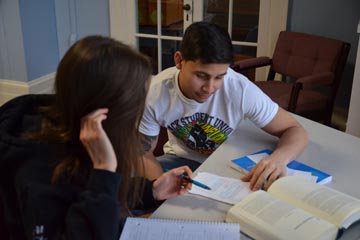
03/18/2016
It’s easy for even the most capable college students to “get lost” when they’ve set out to read dense material on their own, according to SUNY Cortland Associate Professor Raymond Collings.
“One minute, you’re sitting down ready to read and then 20 minutes later your mind is off in Spain,” said Collings, a 13-year member of the College’s Psychology Department who focuses his research on attention spans.
That’s why Collings and a team of SUNY Cortland students are launching The Study Place Project beginning in the 2016-17 academic year. The two-year study aims to help first-year students acclimate faster to college-level academic work, especially when they’re tackling it on their own.
“This is about helping students learn how to be better independent learners,” Collings said. “We’re going to try to help them answer the question, ‘What’s the best way for me to learn?’”
The endeavor will offer student participants access to a distraction-free, controlled study space in the McDonald Building, a College facility located at 60 Tompkins St. that previously housed SUNY Cortland’s speech and hearing clinic.
Collings emphasized the student-designed nature of the project. SUNY Cortland undergraduates in their junior and senior years representing several different academic majors have taken the lead on several tasks, from designing study areas to serving as peer facilitators. Although they won’t necessarily provide content-specific training or tell new students how to study, the upperclassmen will look to help first-year students establish individual goals for academic success.
 |
| The Study Place Project provides a unique workspace and training for first-year students adjusting to academic life. |
Study participants also will gain access to a brief online course in effective study skills — one that covers common first-year challenges such as time management, note-taking and test preparation.
Megan Whitbeck, a senior psychology major from Jamesville, N.Y., was one of the approximately 10 students who helped map out The Study Place Project. She emphasized that upperclass facilitators will assist first-year students in their goal setting without tutoring in a specific subject.
“If a student is having trouble with content in biology, we’ll direct them to the best resources on campus,” said Whitbeck, who also works as a peer tutor with SUNY Cortland’s Academic Support and Achievement Program. “We’re kind of like the kick-start to get them thinking about other resources.
“We’re there to help make goals specific and make sure students are staying on task.”
The jump from high school to college-level studying can be significant for some students, she said. Participants will be asked to visit the McDonald Building twice each week for at least two hours, checking in at the beginning and end of their sessions with peer facilitators.
Study areas will include sofas and tables of different sizes — a student preference that surprised Collings, he said. Participants also will have online access to Pandora Radio if they prefer music during their studies.
“Some folks need totally quiet, others need a little bit of noise,” Collings said. “All of this is designed to ‘what you need’ as a student.”
According to Collings, most people have fully developed their attention spans by late childhood. The Study Place Project won’t try to change that, but instead teach new students how to work more effectively on their own.
“By the time you’re a junior or senior, you’ve learned how to do that,” Collings said. “We just want to speed that up a little bit.”
Whitbeck said her work with The Study Place Project — specifically the research she’s conducted on thinking and behavior — has encouraged her to pursue master’s programs in psychology and then likely a doctoral degree.
“I love the one-on-one interaction and looking at all of these different psychological constructs,” she said.
Participants will be asked to fill out several surveys at the beginning and end of the study, which should help the researchers examine how participation in the project may have affected attitudes towards learning and the overall adjustment to college. The organizers also will look to track the participants’ academic progress throughout their undergraduate careers.
The Study Place Project is funded by the College’s Research and Sponsored Programs Office as well as the William L. Haines ’63 President’s Discretionary Fund, which means there is no cost for participants. They also receive a $30 gift card from Auxiliary Services Corporation, the College’s dining and retail services provider, for their semester-long participation. Peer facilitators earn research credit for their time.
Project organizers will attend the College’s Admissions Open House on Saturday, April 2, as well as different Orientation sessions. Interested applicants can visit the project’s webpage or contact Collings at 607-753-2046 to learn more about the project.